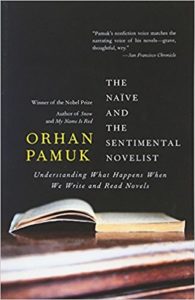If I had read The Naive and Sentimental Novelist before reading Orhan Pamuk’s novels, I probably would not have bothered with them. That would have been a pity because most of them are very good, and one, Snow, is among the best I have ever read. So there’s a considerable gap between this collection of six essays — delivered in 2009 as the Norton Lectures at Harvard University — that describe how he thinks about novel writing and the actual results. Pamuk certainly isn’t the first to be better at doing what he does than he is at explaining it.
I think there are several reasons the essays annoyed me so much, some of them relating to personal tics, at least one related to the process of making this book, and others relating to what Pamuk actually has to say. To take the middle first, Turkish has just one pronoun, “o,” for the third person singular. A person writing in Turkish, as Pamuk does, will not necessarily have to consider whether “he” or “she” is appropriate, whether a more clearly inclusive construction such as “he or she” is necessary, or whether to draw on the venerable but lately deprecated tradition of the singular “they.” Nor will such a writer consider taking the time to recast the sentence to avoid pronouns completely. Pamuk can use “o” any time he writes about a generic individual. His translator, however, has to figure out a way to address the issue in English. In this case, Pamuk’s translator has opted for the generic “he” throughout. I stumbled over that quite a bit, and if there’s one thing I feel strongly about in translation, it’s that you don’t want your readers stumbling over your part of the work. Authors can make silly arguments, sure (some of mine have), but you should not be adding barriers between your readers and the work.
Another problem I had with this work is also related to pronouns. It’s a bit of a personal tic, but it has grown to become one because I think it speaks to a deeper issue in essay writing. Pamuk, like many people writing about literature, uses “we” and “us” quite a bit. The authors show us this; we see that; we read; we feel; writers tell us the other. I doubt that there is a two-page spread in all of The Naive and Sentimental Novelist without at least one “we” or “us.” But in Tonto’s immortal words, “What ‘we’, white man?” Or less flippantly, who does Pamuk mean by “we” and “us”? Assumptions lurk in pronouns, and I do not think that Pamuk has examined his much in this regard. Who is he talking about? Who is he talking to? Greater care figuring this out and answering this question would have produced better essays.
Pamuk also wants to hold up a clear hierarchy among fictional genres. Realistic fiction is pretty good, literary fiction better still, and experimental fiction that pushes boundaries and invents something new best of all. Although Finnegan’s Wake is too much for him. Others, not so much:
Reading genre novels—science fiction, crime novels, period fantasies—we never ask ourselves the questions Borges asked while reading Moby-Dick: What is the real subject? Where is the center? The center of these novels is precisely where we found it before, while reading novels of the same type. Only the adventures, the scenery, the main characters, and the murderers are different. In the genre novel, the profound theme that the narrative must structurally imply remains the same from one book to the next. Apart from the works of a few creative readers like Stanislaw Lem and Philip K. Dick in science fiction, Patricia Highsmith in thrillers and murder mysteries, and John Le Carré in espionage, genre novels do not inspire us with any urge to seek the center at all. It is for this reason that writers of such novels add a new element of suspense and intrigue to their story every few pages. On the other hand, because we are not drained by the constant effort of asking basic questions about the meaning of life, we feel comfortable and safe when reading genre novels. (p. 160)
I’ve just finished reading The Dispossessed by Ursula K. Le Guin, and this will not do at all. Moreover, I’ve also recently read her volume of essays, occasional pieces, and reviews, Words Are My Matter. She has clearer ideas about the values and functions of genres, including realistic or “literary” fiction as its own self-contained genre, than Pamuk does. She writes about other writers with greater precision and greater insight than Pamuk does.
There are some interesting notions in The Naive and Sentimental Novelist. Tying modes of writing and reading to the distinction originated by Friedrich Schiller that gives this volume its title is an interesting way of looking at things. Pamuk’s description of the development of Turkish literature in the second half of the 20th century is interesting. His own ideas of the “center” of a novel are reasonably interesting. He edges up to the idea that writers sometimes (often?) do not know what their book is really about is definitely interesting. He cites Tolstoy and Stendahl in this regard, noting that the parts of their books the authors cared most about are not what posterity has come to value about the works. A deeper look at some of the mysteries of creating would have been rewarding.
On balance, though, skip this and read Pamuk’s actual novels or his reflective essays. Snow is the best of the novels that I have read (which is all but three of them), although The New Life or The White Castle may be a better point of entry. For the essays, Istanbul and Other Colors are both splendid.

